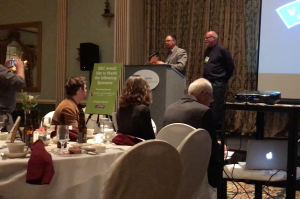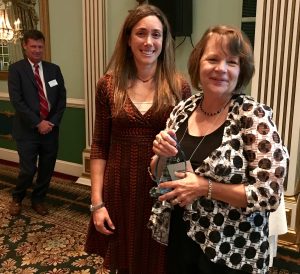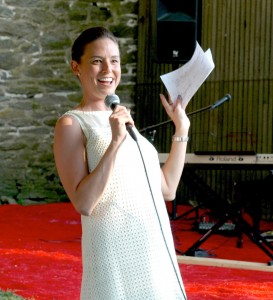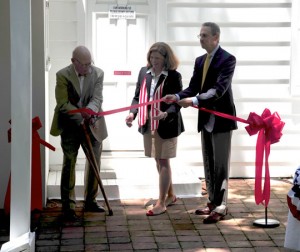The 2017 Dinner & Silent Auction of the Brandywine Red Clay Alliance (BRC) not only tapped into its members’ shared passion for clean water and environmental advocacy, but it also showcased the simpatico efforts of a popular, local beer-maker.

The annual dinner, held on Thursday, Oct. 26, at the Mendenhall Inn, attracted a record crowd of 250 and offered numerous reasons to celebrate, according to Jack Supplee, the BRC’s board president.
Addressing the audience, Supplee cited the success of the merger two years ago of the Brandywine Valley Association and the Red Clay Valley Association, two of the oldest small watershed conservation organizations in the country. He noted that the combined resources facilitated the mission of protecting the Brandywine and Red Clay watersheds.
The genesis of the organization dates back to 1945 when a group of citizens recognized that poorly treated wastewater and soil erosion posed serious dangers to area waterways. Since then, its members have orchestrated a wide variety of initiatives to reverse those threats. Regular offerings include educational programs, summer camps, stream cleanups and riparian buffer plantings.
Supplee, an avid cyclist who has been viewing area waterways for 35 years at 15 mph, said that progress has been visible. “Streams are clearer with less erosion,” he said, quickly adding that more work remains.

Both Supplee and Jim Jordan, BRC’s executive director, stressed the importance of the donors and volunteers who fuel the organization. In 2016, more than 1,200 people donated 7,000 hours, which equates to nearly $170,000 by IRS standards, Jordan said.
Robert G. Struble Jr., BRC’s watershed conservation director, explained that businesses can also make significant contributions, and he provided a host of reasons for choosing Victory Brewing Company as the 2017 recipient of the alliance’s prestigious Clayton M. Hoff Award.
Struble said the award, established in 1987, honored the memory of Clayton Hoff, the Brandywine Valley Association’s first executive vice president, widely regarded as the founder of the small watershed movement in America. The award has only been bestowed five times in its 30-year history.
Victory’s co-founders, Bill Covaleski and Ron Barchet, have demonstrated that same kind of long-term commitment to protecting the Brandywine Valley environment, Struble said. He said the pair, friends who met on a school bus in fifth grade, started the company in February 1996.
“They chose Downingtown because of the Brandywine,” Struble said. “It contains the properties that Bill and Ron felt were necessary as the key ingredient in their beer – the right terroir, as Bill once said.”

The Brandywine also drove the decision to expand at a facility in Parkesburg, Struble said, pointing out that Victory, which also has a brewpub in Kennett Square, is now one of the largest craft brewers in Pennsylvania and sells to 37 states, Puerto Rico, and seven countries. In 2016, Victory forged an alliance with Southern Tier Brewing Company designed to maintain each company’s independence and foster innovation while expanding their resources.
Struble noted that Victory’s Headwaters Grant, established in 2011, has provided more than $18,000 to support BRC projects. The grant was named for Headwaters Ale, a beer that pays homage to clean water. A portion of the profit from each bottle sold goes to local water advocacy groups; to date, that sum exceeds $50,000.
“In addition to financial support, Victory is willing to roll up its sleeves and help with conservation projects,” Struble said. “On many occasions, Bill, Ron and their colleagues from Victory have joined other volunteers in planting trees as part of BRC and other stream restoration projects.”
Struble, who pointed out that BRC is but one of the nonprofits that Victory supports, also cited the company’s penchant for creative recycling and repurposing in its operations as well as its use of solar power. “Victory has walked the walk in reducing its carbon footprint and conserving natural resources,” said Struble. “Victory has set the bar high when it comes to community support and watershed stewardship.”
Covaleski said that the company’s environmentalism was rooted in practicality. He said that after he and Barchet convinced their spouses that starting the company made sense, its name sardonically captured their leap of faith: It will be a victory if this venture succeeds.
At the time, Covaleski said they really didn’t have a lot to lose. Collateral for the loan came from the $51,000 home that Covaleski was rehabbing. “Capital is a tight resource so your mentality is to conserve,” he explained.
From that point on, an anti-waste mentality governed the company’s operations, and Victory’s growth and successes reinforced the importance of the beers’ water source.
“Saying that this award is a great honor is really an understatement because it for us underscores the actions that education and interest can generate,” Covaleski told the audience as he and Barchet accepted the award.
“Ron and I recognized very early on in our operation … that there was an opportunity for us to talk to our community that loved beer about one of the primary ingredients in beer,” Covaleski stated. “And so we have used that educational platform we believe for a very positive outcome: to get a larger community to care about the watershed that nurtures us all.”
In addition to Victory Brewing Company, a number of individuals received BRC recognition. Janet Ebert was named conservationist of the year for her work on myriad botanical surveys that focused on protecting native species.
Carol Buckley, a self-avowed “lab rat” who retired from New Bolton Center in 2015, was honored as the environmental instructor of the year, and Kennett High’s Michael Replogle, who teaches earth and space and environmental science, was cited as teacher of the year. Distinguished Volunteer awards went to Charles Benzel III, Jim Gawthrop, and Deri Gawthrop.
Concluding the evening's festivities, Jordan said he hoped the event's "not-so-subtle message" conveyed the importance of getting more people involved. "It does truly take a village," he said.
The H.E. Myrick Conservation Center, located in Pocopson Township along Route 842, serves as the headquarters of the BRC. The 318-acre, private property is open to the public during daylight hours. For more information on programming or membership, visit http://www.brandywineredclay.org.




Comments